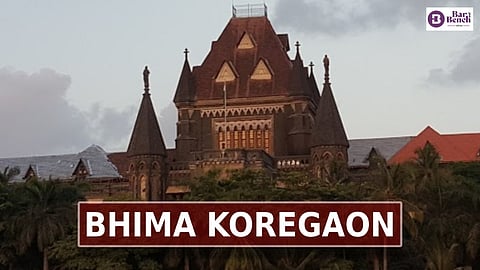
- Latest Legal News
- News
- Dealstreet
- Viewpoint
- Columns
- Interviews
- Law School
- Legal Jobs
- हिंदी
- ಕನ್ನಡ

Eight accused in the 2018 Bhima Koregaon case have moved the Bombay High Court challenging the decision of the Pune Sessions Judge to take cognizance of chargesheet against them and to quash the criminal proceedings (Sudhir Dhawale & Ors. v. State of Maharashtra & Ors.).
The eight accused who have moved the Court are Sudhir Dhawale, Rona Wilson, Surendra Gadling, Shoma Sen, Mahesh Raut, P Varavara Rao, Vernon Gonsalves and Arun Ferreira.
The petitioner accused challenged an order of September 5, 2019 rejecting the default bail application under Section 167(2) of the Code of Criminal Procedure read with Section 43-D (2) of Unlawful Activities (Prevention) Act.
The accused had sought bail on the ground that Pune Sessions Judge RM Pande who signed the order as Special Judge (under the National Investigation Agency), Pune had no jurisdiction to take cognisance of the chargesheet as original jurisdiction in the case was vested with the Magistrate.
In the default bail application filed before the Sessions Judge, the accused had pointed out three notifications issued by the Maharashtra government which pointed out that Special Court had been constituted for Pune city.
The notification pointed out that Judge Pande had not been designated as Special Judge under NIA.
Advocate Sudeep Pasbola argued that "If a court has no jurisdiction then the order in remand or even for custody are in nullity. Only to defeat the right of the accused for bail, these chargesheets came to be filed in haste to make the right infructuous".
He also relied upon an observation made by the Nagpur Bench of Bombay High Court in the bail plea of a co-accused, Surendra Gadling, that UAPA offences have to be tried by the Special Court only.
Pasbola argued that when the accused were produced for custody before the Sessions Judge RM Pande, the accused raised the issue of jurisdiction to entertain the custody applications.
From the period of arrest till the date of taking cognizance of the chargesheet, several interlocutory applications were filed and all the applications were decided by the Special Judge.
The applications raising the issue of jurisdiction had never been decided, and the proceeding thus suffered from gross impropriety, it was submitted.
Pasbola referred to the provisions of UAPA to argue that the provisions of the Code of Criminal Procedure would apply to the offences.
In that situation, a Sessions Court, (whatever may be its designation - special judge under the UAPA or district judge) cannot take cognizance of the offences, Pasbola contended.
Pasbola also pointed out that the concerned judge had used varying self-designations in the orders which indicated a lack of clarity on his part pertaining to the designation, status and jurisdiction in the present case.
Challenging the order rejecting the default bail, the petitioner accused have sought a declaration that the cognizance taken was bad in law and should be quashed.